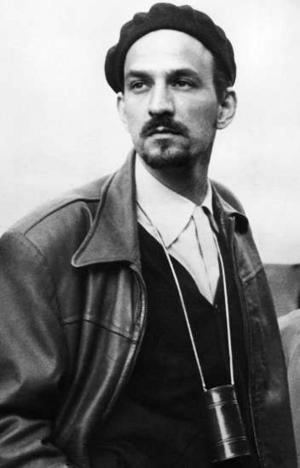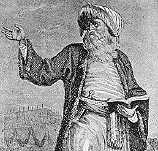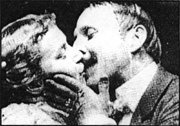This Week in Freethought History (July 14-20)
Here’s your week in Freethought History. This is more than just a calendar of events or mini-biographies – it’s a reminder that, no matter how isolated and alone we may feel at times, we as freethinkers are neither unique nor alone in the world.
 Last Sunday, July 14, but in 1918, Swedish film and theater director Ingmar Bergman was born. Bergman said he lost his faith at age eight but did not come to terms with his nonbelief until he was making his 1963 film Winter Light. Indeed, his film trademark is religious themes and, as his New York Times obituary put it, “Mr. Bergman … centered his work on two great themes – the relationship between the sexes and the relationship between mankind and God.” His film work includes The Seventh Seal (1957), Wild Strawberries (1957), The Virgin Spring (1960, Best Foreign Language Film), Through a Glass Darkly (1961, Best Foreign Language Film), Winter Light (1963), Cries & Whispers (1972) and Fanny and Alexander (1982, Best Foreign Language Film).
Last Sunday, July 14, but in 1918, Swedish film and theater director Ingmar Bergman was born. Bergman said he lost his faith at age eight but did not come to terms with his nonbelief until he was making his 1963 film Winter Light. Indeed, his film trademark is religious themes and, as his New York Times obituary put it, “Mr. Bergman … centered his work on two great themes – the relationship between the sexes and the relationship between mankind and God.” His film work includes The Seventh Seal (1957), Wild Strawberries (1957), The Virgin Spring (1960, Best Foreign Language Film), Through a Glass Darkly (1961, Best Foreign Language Film), Winter Light (1963), Cries & Whispers (1972) and Fanny and Alexander (1982, Best Foreign Language Film).
Bergman was active as director, writer and producer for film, stage and television for more than six decades. One of his chief exponents, filmmaker and fellow atheist Woody Allen, echoes the consensus in the art film world when he describes Ingmar Bergman as “probably the greatest film artist, all things considered, since the invention of the motion picture camera.” In Bergman’s book Images: My Life in Film (1994), he describes how he made his peace with his life-long fear of death—
My fear of death was to a great degree linked to my religious concepts. … You say to yourself that it would have been fun to encounter new experiences once your soul had had a little rest and grown accustomed to being separated from your body. But I don’t think that is what happens to you. First you are, then you are not. This I find deeply satisfying. … That which had been formerly been so enigmatic and frightening, namely, what might exist beyond this world, does not exist. Everything is of this world. Everything exists and happens inside us, and we flow into and out of one another. It’s perfectly fine like that.
 Last Monday, July 15, but in 1099, the First Crusade, or “Campaign of the Cross,” achieved its objective and captured Jerusalem and the Holy Sepulcher or the putative tomb of Jesus. It is important to remember that, although the rest of the Crusades were characterized by lust for wealth and combat (among the knights and clerics), or a passion for escape from serfdom (among the peasantry), the First Crusade was the only one in which the motivation for most was Christian righteousness. Crusaders breached a lightly defended wall, then tore through the city, killing every man, woman and child in sight. Al-Aqsa Mosque was invaded and its occupants butchered. The Dome of the Rock was assaulted and its inhabitants, who had been promised sanctuary, were slaughtered. The city’s main synagogue was burned to the ground, killing many Jews who had taken refuge inside. Those who were not massacred were forced to cart dead bodies out of the city. The First Crusade was the only one of the series that can be considered completely “successful,” but its virtues are completely mischaracterized. The Catholic Encyclopedia claims the Crusades transported novel ideas and trade with the East into Western Europe. Even if these claims were true – it was, in fact, peaceful contact with the Arabs of Spain, before the Crusades, that accomplished this – they would not redound to the credit of Christianity. It is tantamount to saying that it required barbaric wars against (at the time) a superior culture to lift Christendom out of its Dark Ages!
Last Monday, July 15, but in 1099, the First Crusade, or “Campaign of the Cross,” achieved its objective and captured Jerusalem and the Holy Sepulcher or the putative tomb of Jesus. It is important to remember that, although the rest of the Crusades were characterized by lust for wealth and combat (among the knights and clerics), or a passion for escape from serfdom (among the peasantry), the First Crusade was the only one in which the motivation for most was Christian righteousness. Crusaders breached a lightly defended wall, then tore through the city, killing every man, woman and child in sight. Al-Aqsa Mosque was invaded and its occupants butchered. The Dome of the Rock was assaulted and its inhabitants, who had been promised sanctuary, were slaughtered. The city’s main synagogue was burned to the ground, killing many Jews who had taken refuge inside. Those who were not massacred were forced to cart dead bodies out of the city. The First Crusade was the only one of the series that can be considered completely “successful,” but its virtues are completely mischaracterized. The Catholic Encyclopedia claims the Crusades transported novel ideas and trade with the East into Western Europe. Even if these claims were true – it was, in fact, peaceful contact with the Arabs of Spain, before the Crusades, that accomplished this – they would not redound to the credit of Christianity. It is tantamount to saying that it required barbaric wars against (at the time) a superior culture to lift Christendom out of its Dark Ages!
 Last Tuesday, July 16, but in 622, by tradition and on the Western calendar, that Muhammad’s hegira (or hijra, هِجْرَة) occurred – that is, his flight from Mecca to Medina (then called Yathrib) in order to escape persecution and found a community of believers, with himself as political and spiritual leader. Muslim claims to the contrary, this was done for the express purpose of waging war and acquiring booty. Conversions to Islam, most often by threat of the sword, usually followed. Although he borrowed much of Islam from Judaism, and likely from the Palestinian Samaritans, the Jews simply refused to become Muslim. Muhammad (محمد) slew them by the thousands. Most of what we know of Muhammad’s life, laws, prophecies, and conquests comes from Islamic oral tradition transmitted over the century since his death. Clearly, there were alterations in the Prophet’s story following his death in 632. What is just as clear is that it was conquest and loot, more than religion, that were the engines of Islamic progress across Arabia.
Last Tuesday, July 16, but in 622, by tradition and on the Western calendar, that Muhammad’s hegira (or hijra, هِجْرَة) occurred – that is, his flight from Mecca to Medina (then called Yathrib) in order to escape persecution and found a community of believers, with himself as political and spiritual leader. Muslim claims to the contrary, this was done for the express purpose of waging war and acquiring booty. Conversions to Islam, most often by threat of the sword, usually followed. Although he borrowed much of Islam from Judaism, and likely from the Palestinian Samaritans, the Jews simply refused to become Muslim. Muhammad (محمد) slew them by the thousands. Most of what we know of Muhammad’s life, laws, prophecies, and conquests comes from Islamic oral tradition transmitted over the century since his death. Clearly, there were alterations in the Prophet’s story following his death in 632. What is just as clear is that it was conquest and loot, more than religion, that were the engines of Islamic progress across Arabia.
 It was on this date, July 17, 1917, that the comedienne and actress with the distinctive laugh, Phyllis Diller, was born Phyllis Ada Driver. She was a San Francisco housewife with five children when her under-employed husband suggested she try to make a career of the comedic skits she exploited at PTA functions. Diller got her first national exposure as a contestant on the Groucho Marx gameshow “You Bet Your Life” around 1950. Diller’s break was being discovered by comedian Bob Hope while performing in a Washington DC nightclub. She subsequently appeared with Hope in three of his films and almost two dozen of Hope’s TV specials — not to mention her own TV series, “The Pruitts of Southampton” (1966), and a Queen in A Bug’s Life (1998). In her career, she played herself almost as much as she played a character. Part of Diller’s stand-up trademark was mentioning her fictional husband “Fang.” Diller was interviewed for the November 2001 AIDS magazine A&U, which appeared just months before her retirement announcement. Asked how she visualizes the hereafter, Diller replied, “There isn’t any, you dingbat!” After her famous hacking laugh, Diller continued,
It was on this date, July 17, 1917, that the comedienne and actress with the distinctive laugh, Phyllis Diller, was born Phyllis Ada Driver. She was a San Francisco housewife with five children when her under-employed husband suggested she try to make a career of the comedic skits she exploited at PTA functions. Diller got her first national exposure as a contestant on the Groucho Marx gameshow “You Bet Your Life” around 1950. Diller’s break was being discovered by comedian Bob Hope while performing in a Washington DC nightclub. She subsequently appeared with Hope in three of his films and almost two dozen of Hope’s TV specials — not to mention her own TV series, “The Pruitts of Southampton” (1966), and a Queen in A Bug’s Life (1998). In her career, she played herself almost as much as she played a character. Part of Diller’s stand-up trademark was mentioning her fictional husband “Fang.” Diller was interviewed for the November 2001 AIDS magazine A&U, which appeared just months before her retirement announcement. Asked how she visualizes the hereafter, Diller replied, “There isn’t any, you dingbat!” After her famous hacking laugh, Diller continued,
This is it, baby! Enjoy, carefully! Religion is such a medieval idea. Don’t get me started. I have thought about every facet of religion and I can’t buy any of it. … So God made man in His own image? It’s just the other way around. Man made God in his own image. … [I]t’s all about money.
 Last Thursday, July 18, but in 1950, British entrepreneur Richard Branson was born. Branson is the founder of the Virgin Group, which notably includes Virgin Records, Virgin Airlines, and 400 other companies. As of 2012, according to Forbes, Branson is the 4th richest citizen of the United Kingdom, with an estimated net worth of US$4.6 billion. He was knighted in 2000. Although his business strategy has been criticized as “rent-seeking,” that is, manipulating current wealth to flow toward him, rather than creating new wealth, Branson has been considered a viable candidate for Mayor of London. He favors humane and rational drug laws, an international nuclear weapons ban, universal access to broadband Internet service and has been involved in discussions of global warming policy. In a 2011 interview with CNN’s Piers Morgan, Branson said that he believes in evolution and the importance of humanitarian efforts, but not in the existence of God. “I would love to believe,” he said. “It’s very comforting to believe.” In his autobiography, Losing My Virginity (1998), Branson recalls his failed attempt to circumnavigate the earth in a balloon: “I do not believe in God, but as I sat there in the damaged [balloon] capsule, hopelessly vulnerable to the slightest shift in weather or mechanical fault, I could not believe my eyes." (p.239) It was Richard Branson who said, “My general attitude to life is to enjoy every minute of every day. I never do anything with a feeling of, ‘Oh God, I've got to do this today.’”
Last Thursday, July 18, but in 1950, British entrepreneur Richard Branson was born. Branson is the founder of the Virgin Group, which notably includes Virgin Records, Virgin Airlines, and 400 other companies. As of 2012, according to Forbes, Branson is the 4th richest citizen of the United Kingdom, with an estimated net worth of US$4.6 billion. He was knighted in 2000. Although his business strategy has been criticized as “rent-seeking,” that is, manipulating current wealth to flow toward him, rather than creating new wealth, Branson has been considered a viable candidate for Mayor of London. He favors humane and rational drug laws, an international nuclear weapons ban, universal access to broadband Internet service and has been involved in discussions of global warming policy. In a 2011 interview with CNN’s Piers Morgan, Branson said that he believes in evolution and the importance of humanitarian efforts, but not in the existence of God. “I would love to believe,” he said. “It’s very comforting to believe.” In his autobiography, Losing My Virginity (1998), Branson recalls his failed attempt to circumnavigate the earth in a balloon: “I do not believe in God, but as I sat there in the damaged [balloon] capsule, hopelessly vulnerable to the slightest shift in weather or mechanical fault, I could not believe my eyes." (p.239) It was Richard Branson who said, “My general attitude to life is to enjoy every minute of every day. I never do anything with a feeling of, ‘Oh God, I've got to do this today.’”
 Yesterday, July 19, but in 1649, Edward Winslow helped to organize the Society for Propagating the Gospel in New England to Christianize the native people who had helped the beleaguered colonizers through their first winter. Winslow was governor of Plymouth Colony (in what is now Massachusetts) and lost his wife during that harsh winter. Winslow’s band of Separationists had sailed on the Mayflower, via the Netherlands, whose atmosphere was not quite repressive enough, to establish their own theocratic settlement at Plymouth in 1620. It was typical arrogance to suppose that the imported superstitions were in any way superior to the home-grown variety, but the Puritans achieved success just as the early Roman Church Christianized the dissolving Roman Empire: through force and law. The principal drive behind Christianizing the native people of America, aside from the cover story of saving their souls, was to steal land for white settlements. In propagating their Gospel, Winslow and his fellow Christians – from 1649 down to the 1978 American Indian Religious Freedom Act – were behaving in a conspicuously Christian manner toward heathens… with predictably disastrous results. “If you take the Christian Bible and put it out in the wind and the rain,” said one Native American woman, “soon the paper on which the words are printed will disintegrate and the words will be gone. Our bible is the wind.”
Yesterday, July 19, but in 1649, Edward Winslow helped to organize the Society for Propagating the Gospel in New England to Christianize the native people who had helped the beleaguered colonizers through their first winter. Winslow was governor of Plymouth Colony (in what is now Massachusetts) and lost his wife during that harsh winter. Winslow’s band of Separationists had sailed on the Mayflower, via the Netherlands, whose atmosphere was not quite repressive enough, to establish their own theocratic settlement at Plymouth in 1620. It was typical arrogance to suppose that the imported superstitions were in any way superior to the home-grown variety, but the Puritans achieved success just as the early Roman Church Christianized the dissolving Roman Empire: through force and law. The principal drive behind Christianizing the native people of America, aside from the cover story of saving their souls, was to steal land for white settlements. In propagating their Gospel, Winslow and his fellow Christians – from 1649 down to the 1978 American Indian Religious Freedom Act – were behaving in a conspicuously Christian manner toward heathens… with predictably disastrous results. “If you take the Christian Bible and put it out in the wind and the rain,” said one Native American woman, “soon the paper on which the words are printed will disintegrate and the words will be gone. Our bible is the wind.”
 Today, July 20, but in 1910, the Christian Endeavor Society of Missouri began a campaign to ban all motion pictures that depicted kissing between non-relatives. Movies were only just beginning to become a form of mass entertainment: the first couple filmed kissing for the general public was John C Rice and May Irwin in the 1896 film called The Kiss – lasting an epic 30 seconds. The Christian objection is hard to fathom: kissing in public, especially kissing between men, is not only mentioned but even commanded by the Bible:
Today, July 20, but in 1910, the Christian Endeavor Society of Missouri began a campaign to ban all motion pictures that depicted kissing between non-relatives. Movies were only just beginning to become a form of mass entertainment: the first couple filmed kissing for the general public was John C Rice and May Irwin in the 1896 film called The Kiss – lasting an epic 30 seconds. The Christian objection is hard to fathom: kissing in public, especially kissing between men, is not only mentioned but even commanded by the Bible:
“Greet ye one another with a kiss of charity.” (1 Peter 5:14)
“And the LORD said to Aaron, ‘Go into the wilderness to meet Moses.’ And he went, and met him in the mount of God, and kissed him.” (Exodus 4:27)
“And Jacob kissed Rachel, and lifted up his voice, and wept.” (Genesis 29:11)
“So she [the harlot] caught him, and kissed him, and with an impudent face said unto him…” (Proverbs 7:13-14)
“Let him kiss me with the kisses of his mouth: for thy love is better than wine.” Song of Solomon (1:2)
“O that thou wert as my brother, that sucked the breasts of my mother! when I should find thee without, I would kiss thee; yea, I should not be despised.” Song of Solomon (8:1)
“And Naomi said unto her two daughters in law, Go, return each to her mother’s house: the LORD deal kindly with you, as ye have dealt with the dead, and with me. The LORD grant you that ye may find rest, each of you in the house of her husband. Then she kissed them; and they lifted up their voice, and wept.” (Ruth 1:8-9)
“And they lifted up their voice, and wept again: and Orpah kissed her mother in law; but Ruth clave unto her.” (Ruth 1:14)
The reticence about kissing, principally between men and women, really stems from the early Christian belief that the body and sexuality – especially female sexuality – are evil, an idea Christians borrowed (like most of its bad ideas) from the Zoroastrians and perhaps the Essenes. But kissing has been popular at least since the 3,000-year-old Indian epic poem, Mahabharata. Being more natural than religion, kissing shows no signs of being extinguished by religion.
Other birthdays and events this week—
July 14: American news reporter, anchor, and NBC commentator John Chancellor was born (1927).
July 14: American painter James A. M. Whistler (1834) was born.
July 14: French citizens stormed and destroyed the hated Bastille prison in Paris: Bastille Day (1789).
July 16: American founder of “Christian Science,” Mary Baker Eddy, was born (1821).
July 17: American actor Donald Sutherland was born (1934).
July 18: Papal Infallibility was described so that it never had to be used (1870).
July 18: British novelist William Makepeace Thackeray was born (1811).
July 20: Nobel-winning Swedish poet Erik Axel Karlfeldt was born (1864).
We can look back, but the Golden Age of Freethought is now. You can find full versions of these pages in Freethought history at the links in my blog, FreethoughtAlmanac.com.

